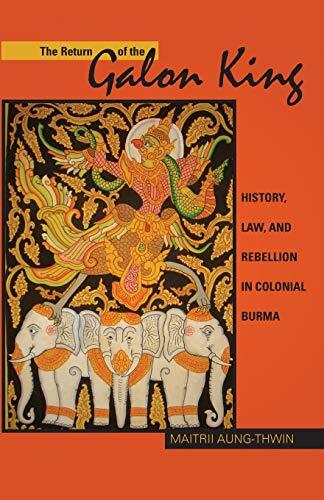
The Return of the Galon King: History, Law, and Rebellion in Colonial Burma
还没有评分
格式
平装书
页数
264
语言
英语
已发布
Nov 22, 2010
出版商
Ohio University Press
版本
1
ISBN-10
0896802760
ISBN-13
9780896802766
描述
In a fascinating exploration of colonial Burma, the narrative delves into the intricate web of history and law that shaped the era of the Galon King. The authors weave a compelling story that brings forth the tensions of rebellion against colonial powers, portraying the resilience and struggle of the Burmese people. The focus on the Galon King's legacy serves not only as a historical case study but also as a lens through which broader themes of identity, governance, and resistance emerge.
The text navigates through the socio-political landscape of the time, illustrating how local laws and cultural practices clashed with colonial regulations. Through meticulous research and insightful commentary, readers are introduced to a pivotal chapter in Southeast Asian history that resonates with contemporary struggles for autonomy and justice.
Engaging with both primary sources and modern interpretations, the work invites readers to reconsider established narratives and to understand the complexities of colonial authority and indigenous responses. This rich narrative challenges preconceived notions, revealing a landscape alive with voices and perspectives historically marginalized.
Ultimately, this volume serves not just as an academic contribution but as a significant commentary on the enduring impacts of colonialism in Burma, reminding us of the legacy of those who fought for their rights and the ongoing importance of their stories in the quest for understanding and reconciliation.
The text navigates through the socio-political landscape of the time, illustrating how local laws and cultural practices clashed with colonial regulations. Through meticulous research and insightful commentary, readers are introduced to a pivotal chapter in Southeast Asian history that resonates with contemporary struggles for autonomy and justice.
Engaging with both primary sources and modern interpretations, the work invites readers to reconsider established narratives and to understand the complexities of colonial authority and indigenous responses. This rich narrative challenges preconceived notions, revealing a landscape alive with voices and perspectives historically marginalized.
Ultimately, this volume serves not just as an academic contribution but as a significant commentary on the enduring impacts of colonialism in Burma, reminding us of the legacy of those who fought for their rights and the ongoing importance of their stories in the quest for understanding and reconciliation.